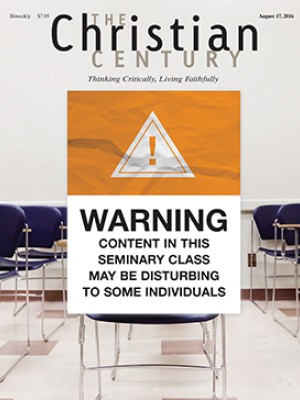Episcopal Divinity School in Massachusetts to stop offering degrees in 2017
The Episcopal Divinity School in Cambridge, Massachusetts, will cease to grant degrees at the end of the upcoming academic year, the seminary’s board of trustees decided July 21 in an 11-4 vote. As a result, its president announced his resignation.
“A school that has taken on racism, sexism, heterosexism, and multiple interlocking oppressions is now called to rethink its delivery of theological education in a new and changing world,” said board chair Gary Hall, in introducing the resolution. “Ending unsustainable spending is a matter of social justice.”
Read our latest issue or browse back issues.
During the next year, the board will explore options for EDS’s future, including merging with another theological seminary, establishing a center for Abrahamic studies, becoming a center for continuing education, and using the seminary’s assets to fund scholarships for seminarians who are devoted to working on issues of peace and justice.
“We need to act quickly while the seminary still has sufficient assets to bring to bear in the next phase of its life,” Hall said. “In fact, our commitment to just compensation for all involved was a prime impetus for acting now. Today we have adequate resources for student, faculty, and staff transitions. Given current financial trajectories, five years down the road we would not.”
No faculty or staff members will be laid off during the upcoming academic year, and all students, including EDS’s final incoming class, which arrives on campus next month, will be “taught out,” Hall said. “This means that we will contract with another seminary or seminaries to accept our students at full credit and we will make sure that students do not bear the expense of this transition.”
Frank Fornaro, interim dean and president of EDS, announced after the vote that he would resign in mid-November.
“I totally disagree with this resolution,” he said.
Bonnie Anderson, vice chair of the board and former president of the Episcopal Church’s House of Deputies, characterized the vote as “a sad but hopeful moment.”
“We understand that people will grieve this decision,” Anderson said. “But by choosing this course now, we are in a much stronger position to ensure EDS’s legacy.”
EDS, which was formed in 1974 through the merger of the Cambridge-based Episcopal Theological School and the Philadelphia Divinity School, is one of the smallest of the ten accredited seminaries of the Episcopal Church. It has long faced financial challenges that are depleting its endowment.
“The school is weakened each day by its ongoing deficit—the future mission of the school is losing about $4,380 per day, or $133,000 per month,” wrote Anthony Ruger, former senior research fellow at the Center for the Study of Theological Education at Auburn Theological Seminary in a report to the board in May.
EDS’s investments are currently valued at approximately $53 million plus its campus. More than half of the endowment is restricted.
Ruger presented numerous models to the board suggesting that even unusual increases in enrollment and fund-raising coupled with significant budget cuts were unlikely to provide a long-term solution to EDS’s financial problems.
Debate at the meeting was intense, with Pamela Conrad, the student representative, and Joan M. Martin, the faculty representative, who do not vote on the board, pressing the trustees to adopt a longer timeline in making its decision and to provide more details about the possible shape of the ongoing discernment process.
“Justice always operates at a deficit,” Conrad said.





